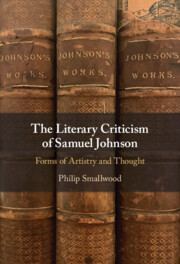Book contents
- The Literary Criticism of Samuel Johnson
- The Literary Criticism of Samuel Johnson
- Copyright page
- Dedication
- Epigraph
- Contents
- Preface
- Acknowledgments
- Abbreviations
- Introduction
- Part I Johnson’s Criticism and the Forms of Feeling
- Part II Critical Relations and the Art of Literary History
- Chapter 3 Petty Caviller or “Formidable Assailant”
- Chapter 4 Readers Curious and Common
- Part III Johnson, Dramatic Poetry and Thinking
- Part IV Time, Truth and History
- Part V Editing Lives, and Life
- Appendix Irony in Revolt: F. R. Leavis Reads Johnson
- Bibliography
- Index
Chapter 4 - Readers Curious and Common
Johnson, Thomas Warton and Historical Form
from Part II - Critical Relations and the Art of Literary History
Published online by Cambridge University Press: 07 September 2023
- The Literary Criticism of Samuel Johnson
- The Literary Criticism of Samuel Johnson
- Copyright page
- Dedication
- Epigraph
- Contents
- Preface
- Acknowledgments
- Abbreviations
- Introduction
- Part I Johnson’s Criticism and the Forms of Feeling
- Part II Critical Relations and the Art of Literary History
- Chapter 3 Petty Caviller or “Formidable Assailant”
- Chapter 4 Readers Curious and Common
- Part III Johnson, Dramatic Poetry and Thinking
- Part IV Time, Truth and History
- Part V Editing Lives, and Life
- Appendix Irony in Revolt: F. R. Leavis Reads Johnson
- Bibliography
- Index
Summary
Johnson’s critical relationship with Thomas Warton is the subject of this chapter. The chapter examines their respective approaches to the writing of poetical history. Warton, as antiquarian, brings old poetry into the light; Johnson brings out the present value of poetry already known. Warton reads past societies through their lost literatures and by measuring the rational relation of historical causes to historical effects; Johnson’s concern is poetry as a source of pleasure and consolation. Warton is often highly digressive as a poetical historian; Johnson is frequently condensed, direct and economical. But the two friends also have much in common, not least their focus upon the literary past as such. This is recalled in Johnson’s work on the Harleian Library catalogue; his sense of the history of the language is manifest in his Dictionary etymologies and his glosses on Shakespearean language. As critics and poetical historians, they share a sense of poetry’s improvement over time. Warton’s audience is in the main the curious reader; Johnson’s is the common reader. But this implies no diminution in the curiosity Johnson brought to the poetical past.
Keywords
- Type
- Chapter
- Information
- The Literary Criticism of Samuel JohnsonForms of Artistry and Thought, pp. 75 - 90Publisher: Cambridge University PressPrint publication year: 2023



